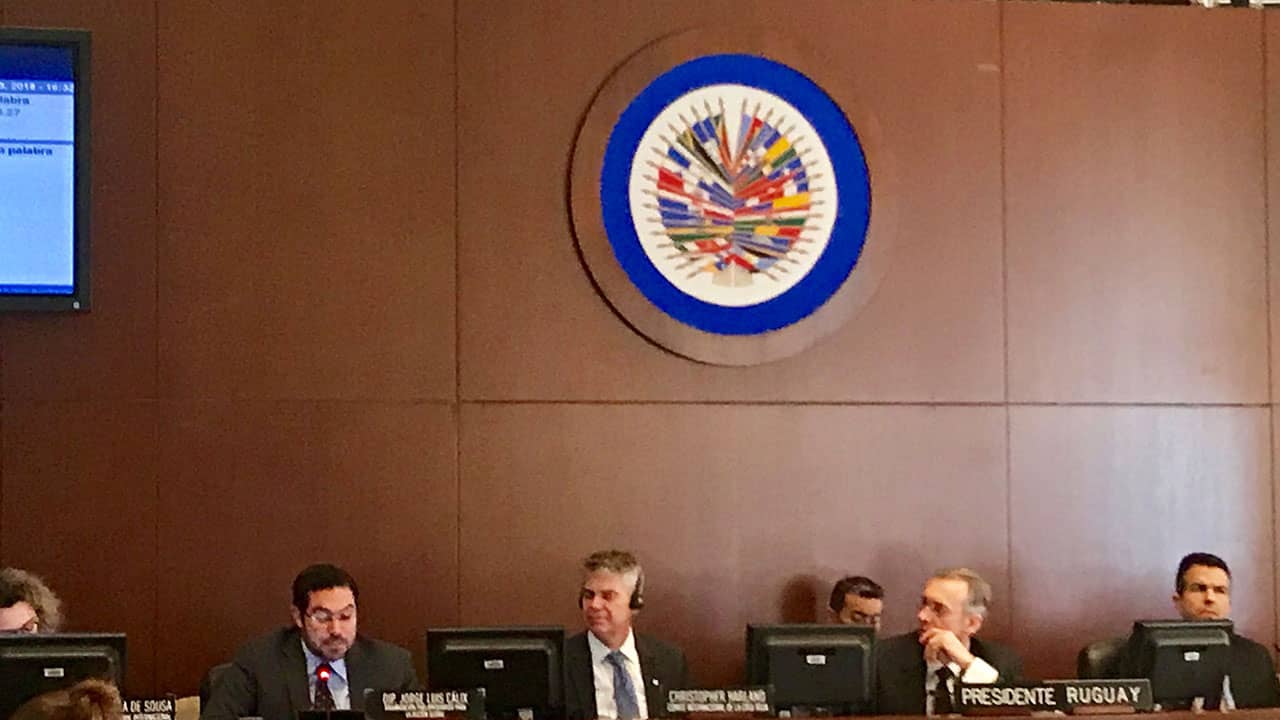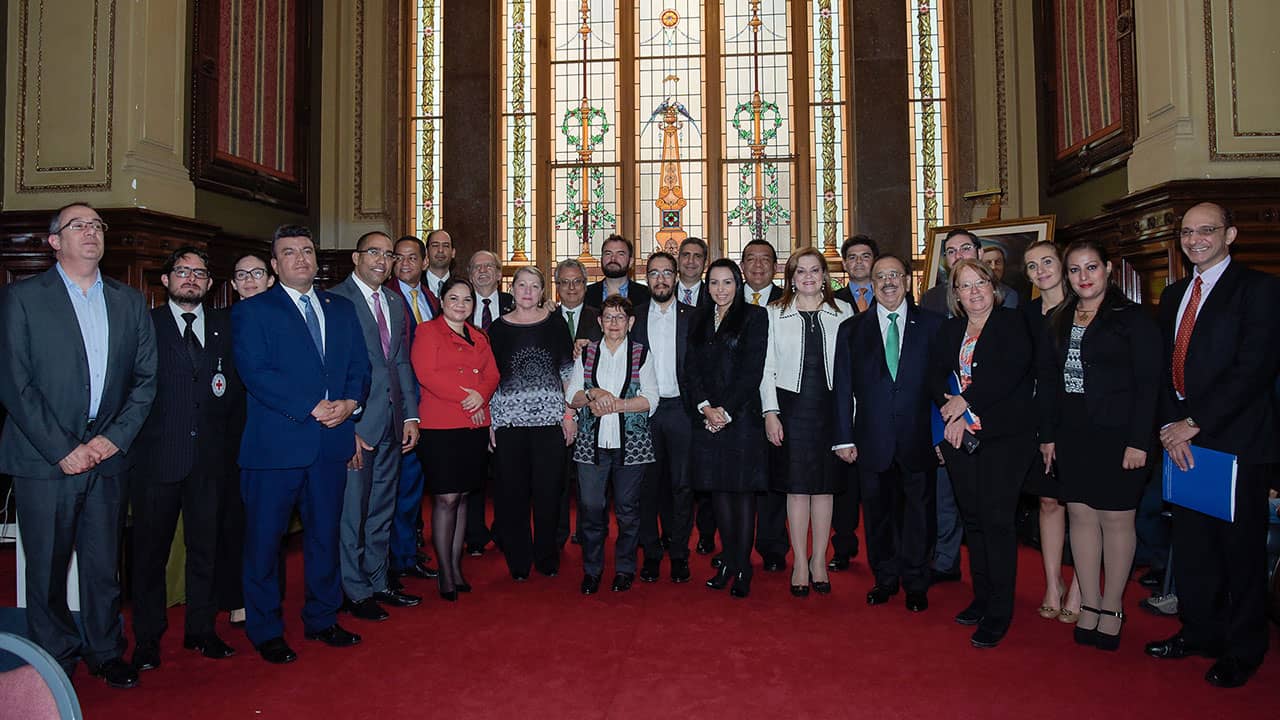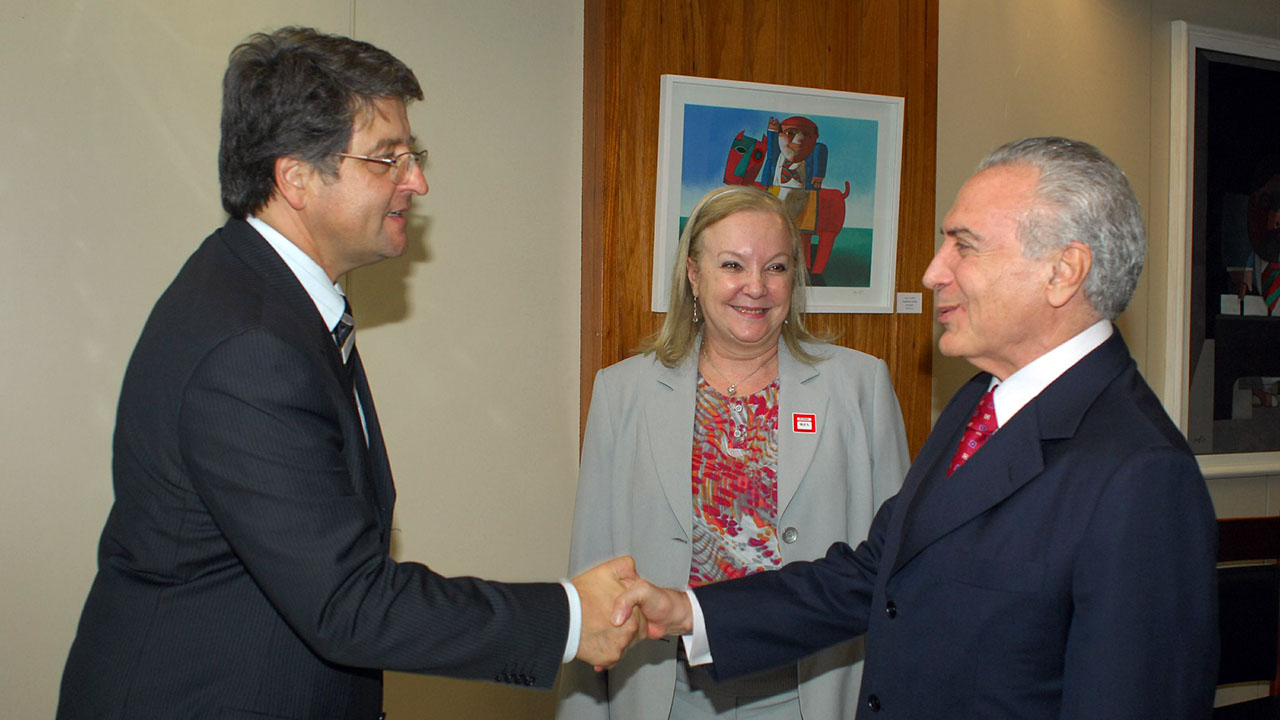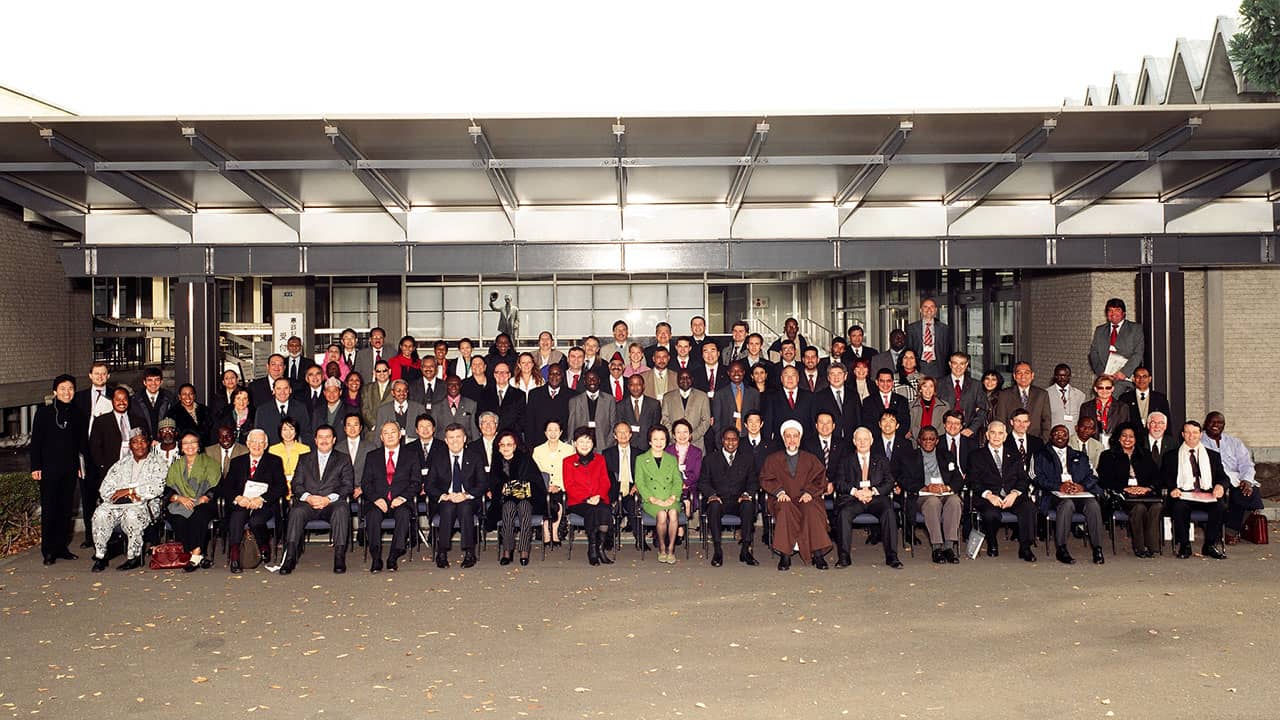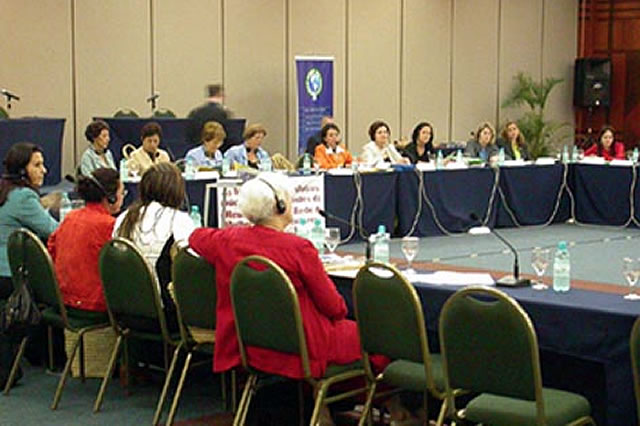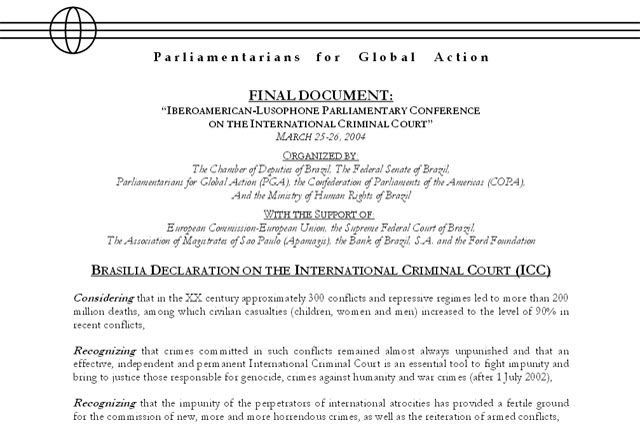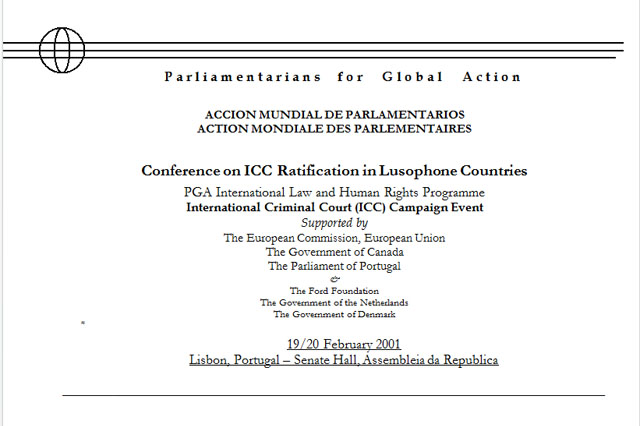Brazil ratified the Rome Statute the 20th of June 2002, becoming the 70th State Party, following a bipartisan agreement on ratification and constitutional amendment facilitated by the two leading PGA Members in the Brazilian Congress.
As State Party, the country is subject to the obligations imposed by the Statute. Even before ratifying, in 2001 the Ministry of Justice ordered the creation of a Working Group to prepare the draft bill for implementation of the Rome Statute, proposing the legal provisions needed to criminalize the offenses, adapt procedures, and regulate cooperation with the International Criminal Court (ICC).
Although Brazil had ratified most of the international treaties and conventions that seek to protect human rights, in terms of national legislation the systematic repression of international crimes was insufficient compared to the international standards set by the Rome Statute.
The Working Group, however, adopted a far broader approach and took advantage of the situation by not only implementing the provisions of the Rome Statute, but also those foreseen in the Geneva Conventions and other treaties related to Humanitarian Law, repealing the existing provisions that did not provide for effective punishment of these international crimes.
On the 23rd of September, 2008, a draft implementation bill, including both complementarity and cooperation provisions, was submitted to the Câmara dos Deputados, the lower house of the National Congress in Brazil (CICC, n.d.). The Comissão de Constitução e Justiça e de Cidadania (Constitutional, Justice and Citizenship Committee) approved the text unanimously in 2009 but it has yet to pass the Plenary in the Lower House, after which it will be discussed in the Senado Federal (Federal Senate). However, somehow the implementation process lost its momentum, and to date there have been no further reports on progress.
Nevertheless, the past few years have been very successful for pro-accountability actors as Brazilian federal prosecutors opened investigations into several enforced disappearances during the 1964-1985 dictatorship and President Dilma Rousseff established a National Truth Commission to look into gross human rights violations committed during a period of almost four decades, from 1946 to 1988.
Rome Statute
Brazil signed the Rome Statute on 7 February 2000 and deposited its instrument of ratification on 20 June 2002 becoming the 70th State Party.
Kampala Amendments of 2010
Brazil attended the Review Conference and joined the consensus to adopt the two Kampala Amendments. Brazil has not yet ratified the Amendments to the Rome Statute adopted by the 2010 Review Conference in Kampala on the crime of aggression and on the use of certain weapons in armed conflict not of an international character. According to the latest information available Brazil is actively working on the ratification of the Kampala Amendments; during the 14th session of the Assembly of States Parties (ASP) Brazil confirmed in its statement during the general debate that “the necessary internal procedures for their entry into force are in progress”.
For more information please click here.
Status on the domestic implementation of the Rome Statute
At the moment the ICC implementation bill is pending in the Chamber of Deputies. For a more complete account of the implementation process see “Progress and PGA Action” below.
Agreement on Privileges and Immunities of the Court (APIC)
Brazil signed the APIC on 17 May 2004 and deposited its ratification at the United Nations on 12 December 2011.
Additional Agreements
Brazil publicly rejected the Non Surrender Bilateral Agreements with the United States of America on September 4, 2002. Moreover, Brazil signed the MERCOSUR common position on June 20, 2005.
Progress and PGA Action
PGA has worked actively with parliamentarians in Brazil since 1999 to promote ratification of the Rome Statute. In February 2001, at the PGA Conference for the Ratification and Implementation of the Rome Statute by Lusophone Countries held in the Parliament of Portugal (during the final months of Cardoso’s Presidency), PGA Members from the government coalition (led by Dip. Antonio Carlos Pannunzio, Chair of the Foreign Affairs Committee) and the opposition (led by Dip. Nilmário Miranda) crafted a bipartisan agreement that led to parliamentary approval of ratification parallel to the initiation of a constitutional revision process to accept the ICC jurisdiction in the Brazilian jurisdictional order. See https://www.pgaction.org/pdf/pre/09_2001Lisbon_rep.pdf .
Parliamentarians from Brazil have remained involved in promoting the universality of the Rome Statute in Latin American and African countries engaging in peer-to-peer dialogue under the leadership of Dip. Orlando Fantazzini, Maria José Da Conceição Maninha and Dip. Dr. Rosinha.
From 18 to 21 August, the President of the Assembly of States Parties (ASP), H.E. Mr. Michel Temer visited Brazil where he met with the Minister of Foreign Affairs, H.E. Mr. Luis Alberto Figueiredo Machado, with the Prosecutor General of the Republic, H.E. Mr. Rodrigo Janot Monteiro de Barros, with the Secretary of National Justice, H.E. Mr. Paulo Abrão Pires Jr., and other officials.
On 12 July 2012, after the official visit of the UN Independent Expert on Human Rights and International Solidarity to Brazil, Senator Paulo Paim called upon the Chamber of Deputies to treat the Draft ICC Bill with utmost urgency.
In March 2012, a PGA delegation accompanied by ICC Judge Sylvia Steiner held consultations in Brasilia to mobilize parliamentarians for the approval of PL-301/2007 which implements the Rome Statute of the ICC in the national legislation of Brazil. Dip. Rosinha (co-author of the project together with Dip. Fantazzini) hosted and organized a number of meetings with key stakeholders. Sen. Paulo Paim intervened at the Plenary of the Senate to urge for a prompt submission and subsequent approval of the draft bill. The initiative received support from several parties. Subsequently, on 20 March 2012, the ICC implementation bill was marked as urgent item for discussion in the plenary of the Chamber of Deputies where the project has languished since then.
In March 2007 Dip. Rosinha reintroduced the draft implementation bill (PL-301/2007) to the Chamber of Deputies. With PGA members actively supporting the parliamentary treatment of the bill, the project receives approval by the Human Rights and Minorities Committee in June 2007 and by the Foreign Affairs and National Defense Committee in November 2007, after having incorporated several amendments proposed by Dip. Claudio Cajado. Finally, in April 2008 the project is approved by the Constitution, Justice and Citizenship Committee and in September that same year President Lula submits the bill to the Chamber of Deputies (PL-4038/2008). Regrettably, this version introduces a number of procedures expanding the reach of military jurisdiction over ICC crimes.
After consistently calling on the government to submit the implementation bill to the Congress for consideration, PGA member Dip. Orlando Fantazzini tabled in 2006 a draft bill to incorporate the definition of the ICC crimes and measures for cooperation (PL-6830/2006), but it was archived because of a lack of action.
The process of implementation of the Rome Statute was initiated by a working group of experts who submitted to the Casa Civil a draft bill on ICC crimes and cooperation for Presidential approval. After a number of years under examination the draft was send back to the working group in light of some constitutional concerns. It would take until 2008 for this draft to be completed. Meanwhile, in 2004 Article 5(4) of the Constitution was amended to recognize the jurisdiction of the ICC, among others.
PARLASUR
On 4 August 2014, the President of the ICC, Judge Sang Hyun Song, traveled to Montevideo, Uruguay, in the context of his participation in the 85th ordinary period of sessions of the Organization of American States (OAS) which took place in Rio de Janeiro, Brazil, to sign an Exchange of Letters between the ICC and the Parliament of the MERCOSUR (PARLASUR). The Exchange of Letters between the ICC and PARLASUR provides for the establishment of a framework agreement which sets the basis for cooperation between the ICC and the PARLASUR as well as the promotion and dissemination of the principles, values and provision of the Rome Statute and international law in general. This agreement has been the result of joint efforts of PGA and the CICC to enhance cooperation between MERCOSUR and the ICC. In order to endorse the strengthening of cooperation, on 12 May 2014, a PGA delegation integrated by Dip. Felipe Michelini (PGA Executive Committee member and Convenor of the International Law and Human Rights Program of PGA) and Dip. Berta Sanseverino (President of the PGA National Group in Uruguay) met with the Executive Board of the MERCOSUR Parliament. Following this meeting and in the margins of a high level Seminar on cooperation with the ICC held on 20 and 21 May 2014 in Buenos Aires Argentina, PGA facilitated an Official Meeting of PARLASUR representatives and the Registrar of the ICC, Mr. Herman von Hebel, to discuss the possibilities for cooperation between both organizations. The meeting led to the conclusion that full cooperation would be fundamental in order to achieve common goals, such as the protection of human rights, and this eventually culminated in the signature of the Exchange of Letters. To see the complete press release: English | Spanish.
Cooperation between MERCOSUR and the ICC is an important achievement for Brazil since it is the major player in MERCOSUR and its main financial contributor (around 70% of the budget). Over the past decade, Brazil has begun to stand out for its assertive participation in international politics, where it has favored anti-hegemonic and multi-polar positions. During the Lula administration from 2003 to 2010 Brazil has asserted a position of both regional and global leadership and has gradually started to shoulder the costs inherent to international cooperation, global governance and regional integration. Although MERCOSUR initially started out as a common market, it became increasingly seen as a platform for a broader integration process, as witnessed by the framework agreement with the ICC. With Brazil taking decisive responsibility for the regional integration process and an increasing presence in different multilateral forums, new opportunities to exercise its influence in a positive way have opened up. In other words, Brazil can take advantage of its position as an emerging power to encourage other countries to adhere to the Rome Statute system and cooperate with the ICC, at the same time providing important counterbalance to other established or emerging powers that have been less cooperative or sometimes even antagonistic, such as the United States for example.
Organization of American States (OAS)
As a member of the Organization of American States, Brazil has supported the promotion of the International Criminal Court through the adoption of an annual resolution by the General Assembly of the OAS, as well as by holding an annual high level work meeting within the Political and Juridical Affairs Committee of the OAS. PGA members have been invited at numerous occasions to this meeting. For more information on the work of PGA within the OAS, click here.
United Nations
In 2013, the UN General Assembly held its first-ever high-level Thematic Debate on “The Role of International Criminal Justice in Reconciliation”. The then Permanent Representative of Brazil to the United Nations, Ambassador Ribeiro Viotti, made a statement on behalf of Brazil in which she emphasized Brazil’s commitment to the International Criminal Court since its very beginnings. Addressing the Court’s role in reconciliation the Ambassador said that the more a process is developed on the basis of inclusive consultations, the better societies fare in achieving justice, reconciliation and truth. In this context, she stressed two fundamental principles: the recognition of the primacy of national jurisdictions, and the importance of trying to ensure national ownership. The Ambassador went on to express her disappointment with the two Security Council referrals which had been stained with “judicial accountability a la carte”. The exemption of certain categories of people from the Court’s jurisdiction for political reasons was considered by Brazil to be morally wrong and a contravention of international law. Brazil also stated that the expenses of Security Council Referrals should be met with UN funds, so as not to let the Court take on the financial burden of such referrals alone.
Diplomatic Commitments
On 11 June 2012, the Ministers of Foreign Affairs of the Union of South American Nations (UNASUR) Argentina, Bolivia, Brazil, Chile, Colombia, Ecuador, Guyana, Paraguay, Peru, Suriname, Uruguay, and Venezuela called upon all States Parties to ratify the amendments adopted in Kampala. View the UNASUR letter here.
On 17 July 2015, on the occasion of the International Criminal Justice Day, the Minister of Foreign Affairs of the UNASUR invited States that are not yet Parties to ratify or accede to the Rome Statute. They also reiterated their strong support to the International Criminal Court among other issues regarding the ICC and the Rome Statue. View the UNASUR Declaration of the 17th July 2015 here.
Human Rights Council Universal Periodic Review
During the First Cycle of the UN Human Rights Council Universal Periodic Review (UPR), Brazil manifested itself as a staunch promoter of the ICC system, recommending the ratification or adherence to the Rome Statute to 22 countries in total. In 2008, when Brazil was under review it accepted the recommendations to enhance (access to) the judicial system and to implement serious human rights violations under Federal Law at the earliest moment possible, made by Mexico and the Netherlands respectively.
During the Second Cycle of the UPR, Brazil recommended Monaco to ratify the Rome Statute and made several other justice related recommendations to other countries, including, but not limited to: Mexico (revising relevant legal provisions to ensure the jurisdiction of civil courts over human rights abuses committed by state), Guinea (accepting the visit of the Special Rapporteur on the promotion of truth, justice, reparation and guarantees of non-recurrence, with a view to providing accountability and redress for victims and their families), and Colombia (giving continuity to efforts undertaken to implement measures of care, assistance and comprehensive reparation to the victims of the internal armed conflict). Brazil itself came under review in 2012 and received recommendations from both Slovakia and Slovenia to fully align its national legislation with all obligations under the Rome Statute, including provisions to enable cooperation with the ICC. Several countries (Paraguay, Argentina and France) made recommendations with regard to the Truth Commission, which had been created in 2011, urging Brazil to guarantee its proper functioning, including through the allocation of sufficient resources, in recognition of victims and victims’ relatives to truth and justice.
Further Relevant Information
Prosecution of International Crimes in Practice
The major turnaround in favor of accountability came when the Brazilian Supreme Court recognized the ongoing nature of the crime of enforced disappearance for the first time in 2012 in two different cases. The argument of disappearance as a continuous crime has been used successfully by prosecutors elsewhere in Latin America to end the legacy of impunity left by authoritarian regimes. The ongoing crime thesis sustains that in the case of the disappearance of persons abducted by state agents, the crime of kidnapping continues until a judge determines whether or when the victim died. Prior to this, the Supreme Court had already recognized the continuous nature of enforced disappearances in 2010 and 2011 in two decisions to extradite alleged perpetrators of crimes against humanity to Argentina. According to a public statement by Amnesty International, the extradition order exposed “the hypocrisy at the heart of Brazil’s refusal to deal with its own past crimes.” Furthermore, in November 2010 Brazil ratified the International Convention for the Protection of All Persons from Enforced Disappearance, which imposes on Brazil the specific obligations to ensure the effective investigation and prosecution of the crime as well as adequate compensation for the victim. Most importantly, when Brazil ratified this treaty it did not include any reservations regarding the application of the convention to outstanding, continuous cases of disappearances. Another important event that contributed to the growing pressure upon the Brazilian government to look into the past crimes was the Inter-American Court’s decision in the case of ‘Gomes-Lund et al (Guerrilha do Araguaia) v. Brazil’ a few days earlier, which asserted that Brazil had not complied with its obligations to investigate and prosecute the members of the military responsible for the arbitrary detention, torture, and enforced disappearance of 70 people, violating its obligations under the Inter-American Convention on Human Rights by using the 1979 amnesty to shelter the perpetrators.
More than one year after the Inter-American Court’s decision in the Guerrilha do Araguaia case, the Ministério Público Federal (Federal Public Ministery) created a Working Group called Justiça de Transição (Transitional Justice) to investigate crimes committed during the military dictatorship. The Public Prosecutor Luiz Fernando Lessa stated that “in compliance with the decision by the Inter-American Court, the 2nd Chamber of the Federal Public Ministry acknowledged that the international human rights treaties ratified by the country require the Federal Public Ministry and the Federal Court to investigate and prosecute the crimes committed during the military dictatorship in Brazil.” Within a week the Procuradoria Geral da República (Attorney General’s Office) released a statement that it would undertake action with regard to the Araguaia case, referring the outstanding complaint against the retired Army General Sebastião Curió Rodrigues de Moura - at the time known as ‘Dr. Luchini’ - for his involvement in the disappearance of five militants during the repression of the Araguaia guerrilla to the Federal Court in Marabá, Pará. In its statement the MPF voiced their adherence to the ongoing crime thesis by stating that “the mere suspicion that the victims are likely dead is irrelevant to the MPF” and “the concrete fact alone that the whereabouts of the victims after they were deprived of their liberty remains unknown nor have their remains been found is sufficient [reason for investigation].”
A month after the Public Prosecutor’s statement on the Araguaia case, federal prosecutors filed another case for abuses committed during the military dictatorship. In this case, criminal charges were brought against Carlos Alberto Brilhante Ustra, a retired army colonel and former head of the country’s intelligence service and one of his subordinates, for their alleged role in the enforced disappearance of Aluísio Palhano Pedreira Ferreira, a prominent leader of the banking syndicate and member of the Popular Revolutionary Vanguard guerilla group (Vanguardia Popular Revolucionaria, VPR), in May 1971. During the period in which Ustra headed the Brazilian intelligence and repression agency, known as DOI-Codi (Destacamento de Operações de Informações – Centro de Operacões de Defensa Interna), from September 29, 1970 to January 23, 1974, at least 45 cases of killings and enforced disappearance were recorded, according to the report of the National Truth Commission, whereas Human Rights Groups claim that he was responsible for the illegal arrest and torture of more than 500 Brazilians during the same period. Over the past years, several attempts were made to initiate proceedings against Ustra, but not all of them thrived. However, in 2008 he became the first torturer of the military regime to be recognized as such by the judicial authorities. He also became the first military to be ordered to financially compensate the relatives of a victim, when in June 2012 a judge sentenced Ustra to pay damages to the relatives of Eduardo da Rocha Merlino, a journalist and member of the Communist Workers’ Party (Partido Operário Comunista, POC) who died in 1971 after several torture sessions while in police custody. The former intelligence chief died the 15th of October, 2015, aged 83, while appeals against the ruling were still ongoing. Shortly before his death the Federal Court in São Paulo had dismissed the complaint of the Federal Prosecutor against Colonel Ustra and two of his subordinates for their involvement in the kidnap, torture and murder of Carlos Nicolau Danielli, one of the leaders of the Brazilian Communist Party (Partido Comunista do Brasil), in 1972. According to the judge in question, the criminal facts attributed to the accused fell under the Amnesty Law and were therefore not punishable. In the published decision the judge reiterated that her intention was not “to cover up terrible acts committed in the past, but rather to point out that social peace is given, sometimes, with great difficulty, and for this there is the high cost of the feeling of impunity among those who experienced the excesses of oppression themselves.”

